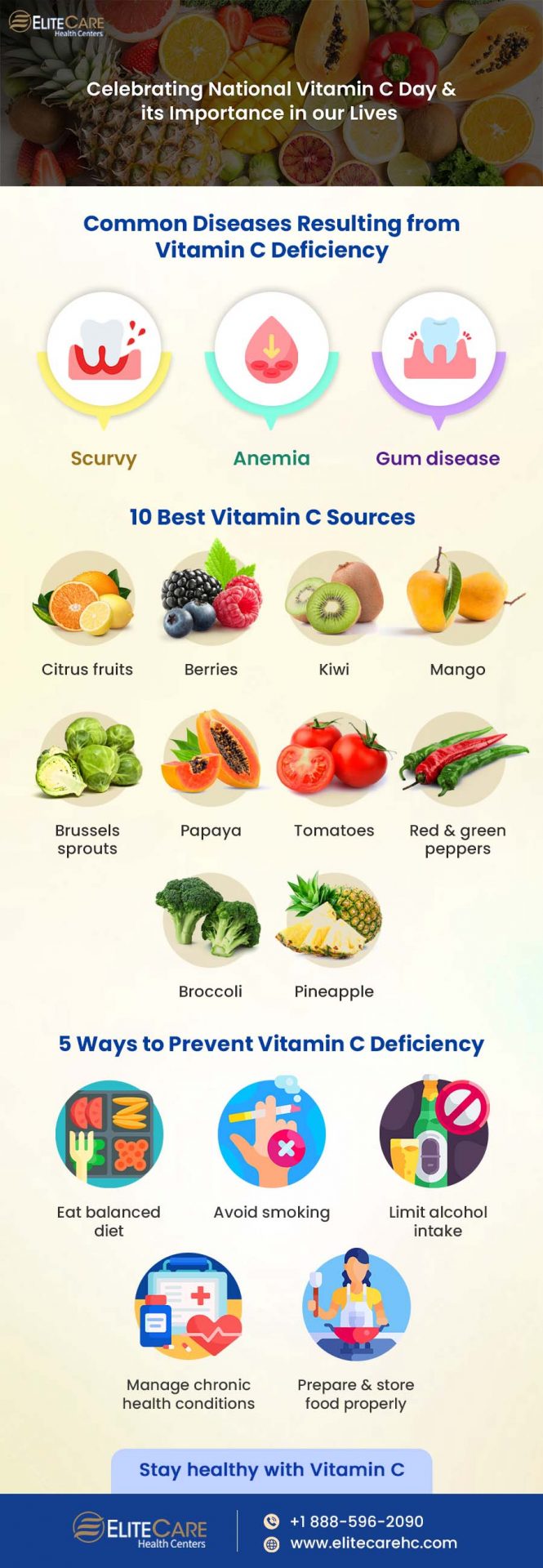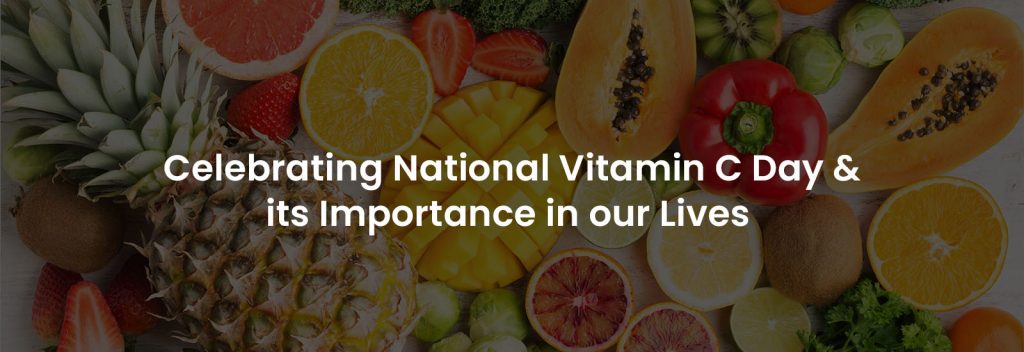
Every year on April 4th, National Vitamin C Day is celebrated to raise awareness about the importance of getting enough Vitamin C in our daily lives. Also known as ascorbic acid, Vitamin C is a water-soluble vitamin essential for various bodily functions. The benefits of Vitamin C are tremendous. It keeps the immune system strong, improves wound healing, and helps prevent chronic diseases.
Seniors, in particular, require adequate amounts of Vitamin C in their diets to maintain overall health and well-being. With age, the body becomes less efficient at absorbing and utilizing nutrients, making it crucial to pay extra attention to their Vitamin C intake.
Keep reading for a comprehensive overview of Vitamin C’s role in seniors’ health, the common problems associated with inadequate Vitamin C intake, and how to prevent and cure them.
Why is Vitamin C Important for Seniors?
Essential for various bodily functions, Vitamin C impacts tissue growth and repair, strengthens immune health, maintains healthy skin, and improves cardiovascular function. It is an antioxidant that helps to protect cells from damage caused by harmful molecules called free radicals.
Vitamin C also plays a crucial role in synthesizing collagen, a protein that is the primary component of connective tissues such as skin, cartilage, and bones. It helps the body absorb iron from plant-based foods and supports the immune system by promoting the production of white blood cells that fight infections. Vitamin C has been shown to help reduce the risk of chronic diseases such as heart disease and cancer, which are more common in older adults.
Recommended daily intake of Vitamin C for Seniors
Seniors often have low Vitamin C levels, but severe deficiency is rare. According to the National Institute on Aging, recommended daily intake of Vitamin C for seniors is, 75 mg for women and 90 mg for men per day. However, some studies suggest that higher doses of Vitamin C may be beneficial for older adults, particularly those who smoke, have chronic diseases, or live in areas with high levels of pollution. It is essential to consult a primary care physician before taking any Vitamin C supplements or drastically altering one’s diet.
Common Diseases Resulting from Vitamin C Deficiency
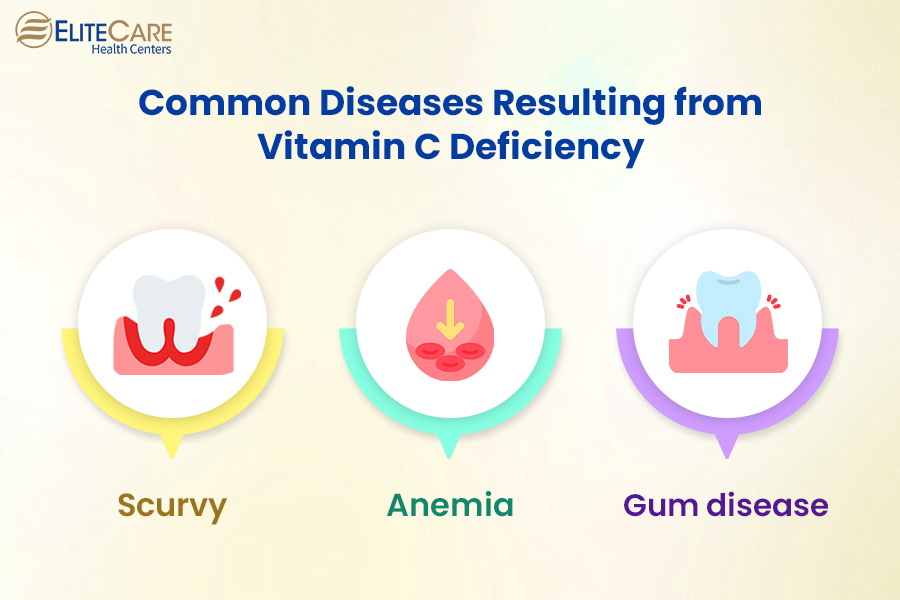
When the body does not get enough vitamin C, it can lead to various health issues. The most common Vitamin C deficiency disease in seniors include:
1. Scurvy
Severe Vitamin C deficiency causes fatigue, weakness, and muscle and joint pain. It can also cause bleeding gums and skin rashes and slow wound healing. Scurvy is rare in the United States. Older adults who do not get proper nutrition are most affected by scurvy.
2. Anemia
Vitamin C helps the body absorb iron necessary to produce red blood cells. A lack of Vitamin C can lead to anemia, which can cause fatigue, weakness, and shortness of breath.
3. Gum Disease
A lack of Vitamin C can lead to gum disease, which can cause bleeding, inflammation, and eventually tooth loss.
Risks Associated with Disease resulting from Vitamin C Deficiency
Health problems that can arise due to untreated Vitamin C deficiency are as follows:
- Increased risk of infections
- Weakened immune system
- Chronic conditions such as heart disease and cancer
- Cognitive impairment
- Poor quality of life
Best Dietary Sources of Vitamin C for Seniors
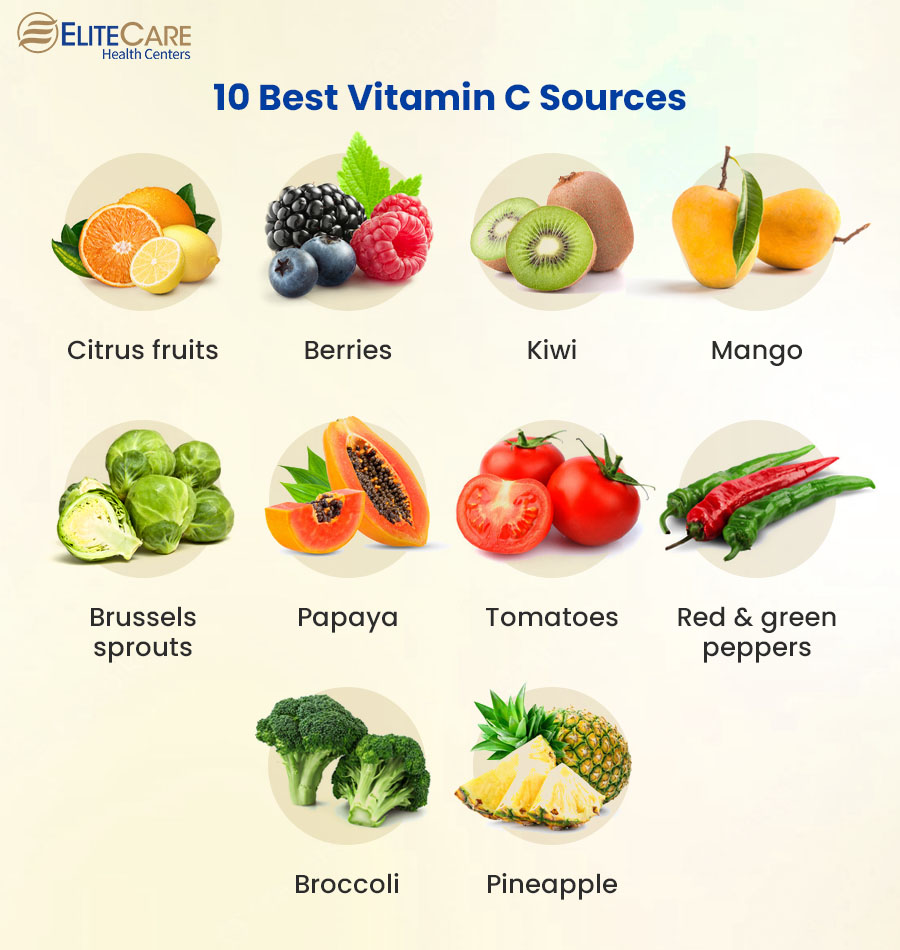
Certain fruits and vegetables are high in Vitamin C, such as:
- Citrus fruits such as oranges, grapefruits, and lemons
- Berries such as strawberries, raspberries, and blueberries
- Kiwi fruit
- Mango
- Pineapple
- Papaya
- Tomatoes
- Red and green peppers
- Broccoli
- Brussels sprouts
If dietary vitamin C sources are insufficient, seniors can consider taking Vitamin C supplements. Our medical clinic’s senior care service provider can help older adults with supplement recommendations. It is important to maintain optimum level of Vitamin C intake through diet, as excess dose of Vitamin C can cause digestive issues and interact with certain medications.
Treatment Options for Vitamin C Deficiency
Sometimes simple modifications in diet can greatly impact one’s health. Here are treatment options for slight to severe Vitamin C deficiency
1. Dietary changes
Increase the intake of Vitamin C rich foods.
2. Vitamin C supplements
If dietary changes are not enough, seniors can take Vitamin C supplements.
3. Medical treatment
For severe Vitamin C deficiency, medical treatment may be necessary. Physicians at medical clinics may prescribe Vitamin C injections or recommend hospitalization at medical clinic for treatment.
Preventive Measure
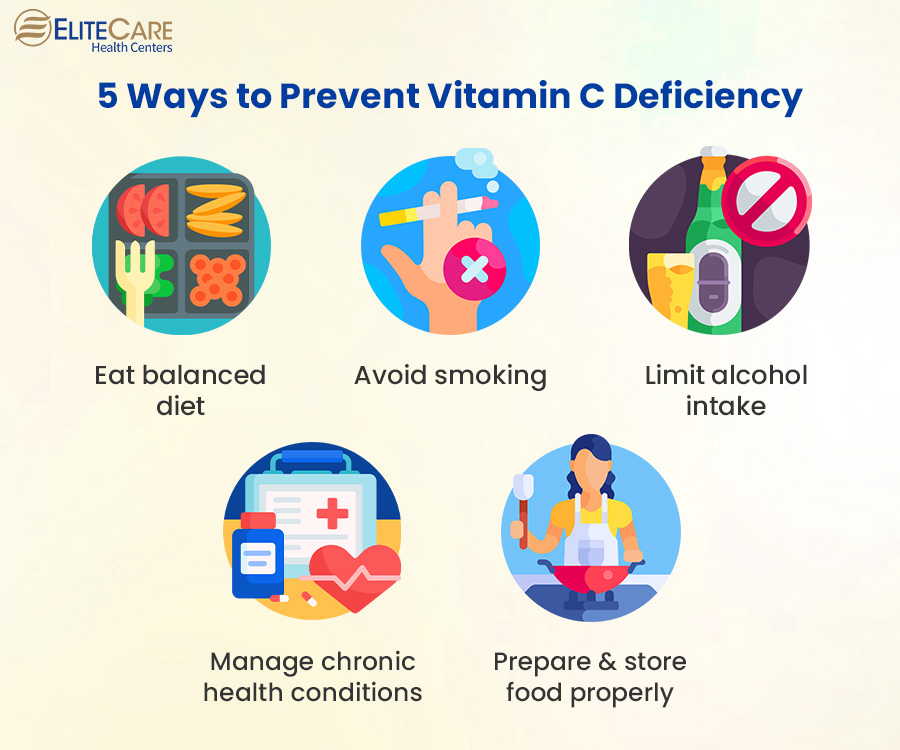
The following measure can be taken to prevent Vitamin C deficiency in seniors:
1. Eat a balanced diet
Seniors should aim to eat a balanced diet that includes a variety of fruits and vegetables to ensure adequate Vitamin C intake.
2. Avoid smoking and excessive alcohol consumption
Smoking and excessive alcohol intake can deplete the body’s Vitamin C levels and increase the risk of Vitamin C deficiency.
3. Manage chronic health conditions
Diabetes and kidney disease can increase the risk of Vitamin C deficiency. Seniors should work with their senior care service provider to manage these conditions and prevent Vitamin C deficiency.
Read More: 7 Ways to Prevent Chronic Kidney Disease in Seniors
4. Store and prepare food properly
Storing and preparing food correctly can help preserve the Vitamin C content. Seniors should store fruits and vegetables in a cool, dry place and avoid leaving them in direct sunlight. They should also avoid cutting fruits and vegetables until just before consuming them to minimize exposure to air and light which can reduce the vitamin content.
Takeaway
Vitamin C is an essential nutrient and vital to maintaining overall health and well-being. As National Vitamin C Day approaches, we encourage everyone to celebrate the day by spreading awareness about the importance of Vitamin C and its role in maintaining optimal health. You can share information about the benefits of Vitamin C with your friends and family and encourage them to eat a rich balanced diet or consider taking Vitamin C supplements. We at Elite Care provide a range of senior care services. Our primary care physicians at our medical clinics in Florida are some of the best healthcare providers for various senior care services.
